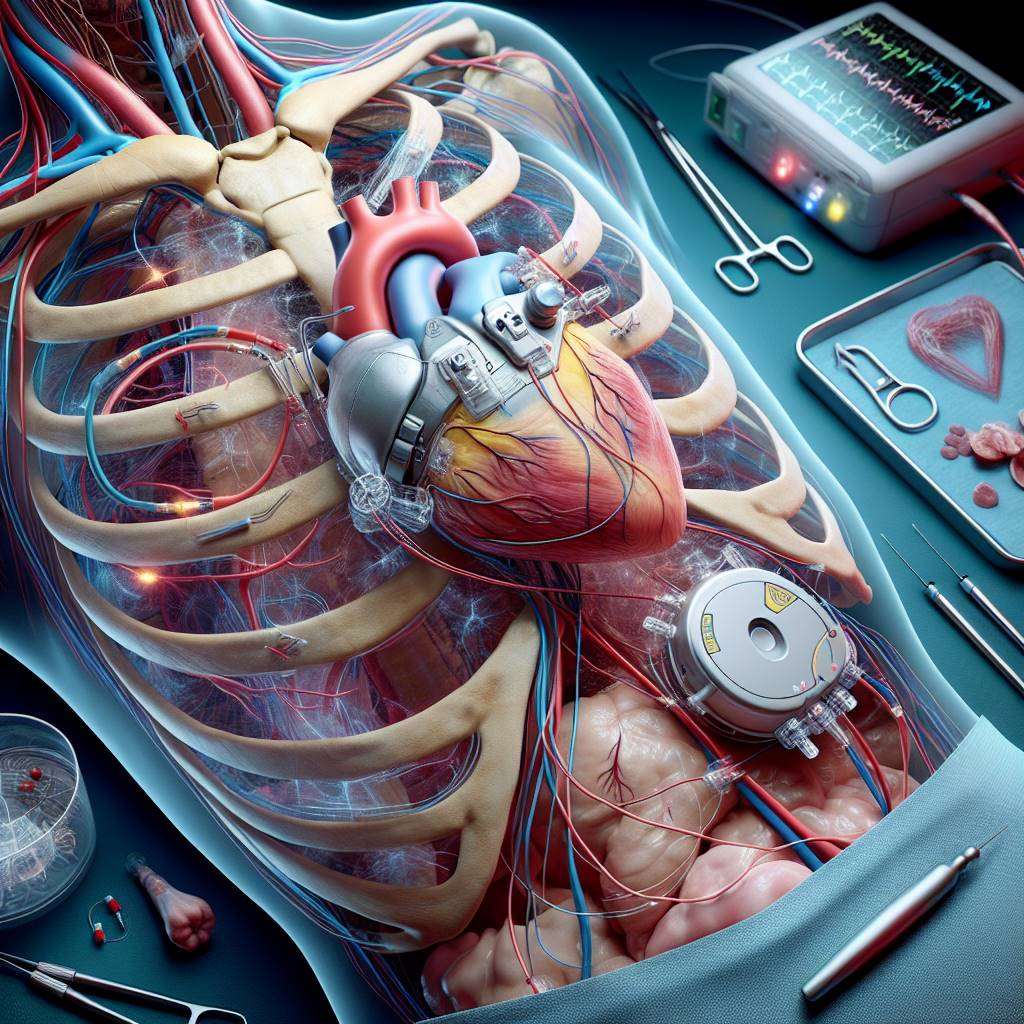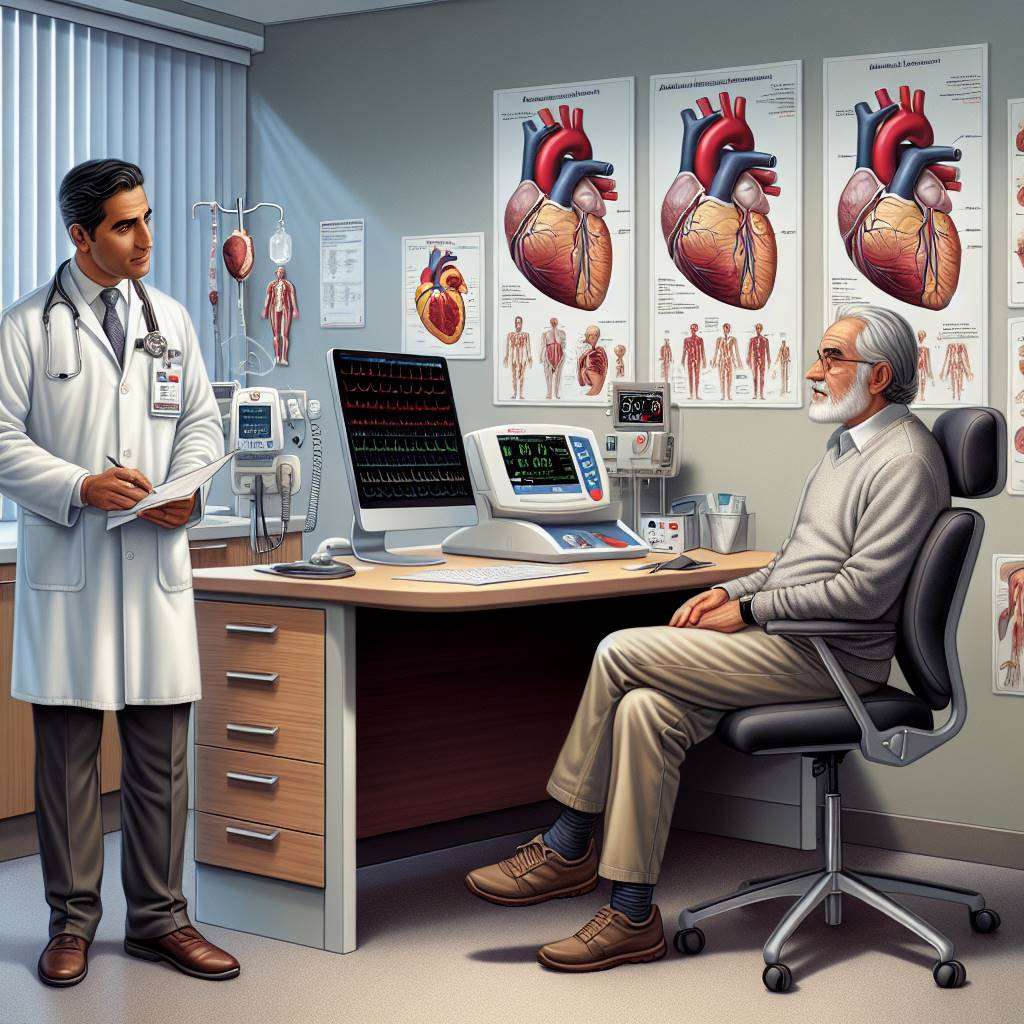An AICD (Automatic Implantable Cardioverter Defibrillator) is a life-saving device designed to monitor and regulate abnormal heart rhythms. It is especially crucial for patients at risk of sudden cardiac arrest (SCA), a condition that can occur without warning. Understanding who needs an AICD is vital for timely intervention and improved survival rates.
Medical disclaimer: This content is for general awareness and does not replace a doctor’s consultation. For diagnosis or treatment decisions, consult a qualified specialist.
Identifying high-risk cardiac patients who may benefit from an AICD involves evaluating their medical history, heart function, and risk of life-threatening arrhythmias. By raising awareness about AICDs and their role in preventing fatal cardiac events, patients and healthcare providers can make informed decisions about treatment options and long-term care.
What Is an AICD and How Does It Work?
An AICD is a small, battery-powered device implanted under the skin, typically near the collarbone. It continuously monitors the heart's rhythm and delivers electrical shocks when it detects dangerous arrhythmias such as ventricular fibrillation or ventricular tachycardia. These shocks restore the heart to a normal rhythm, preventing sudden cardiac arrest.
The device consists of a pulse generator and leads (wires) that connect to the heart. The pulse generator houses the battery and circuitry, while the leads transmit electrical signals between the heart and the device. Modern AICDs are highly advanced, capable of distinguishing between life-threatening arrhythmias and less severe irregularities, ensuring appropriate treatment.
AICDs are often recommended for patients with a history of heart failure, previous cardiac arrests, or significantly reduced ejection fraction (a measure of heart function). Their ability to prevent fatal outcomes makes them a cornerstone in managing high-risk cardiac conditions.

Signs You Might Need an AICD Implant
Recognizing the signs that indicate the need for an AICD implant is crucial for preventing life-threatening cardiac events. Patients with frequent episodes of ventricular arrhythmias or those who have survived a sudden cardiac arrest are primary candidates for this device.
Other warning signs include fainting spells, unexplained dizziness, or a history of heart failure. Individuals with a family history of sudden cardiac death or genetic conditions like long QT syndrome may also require an AICD. These symptoms and risk factors should prompt immediate medical evaluation.
- History of life-threatening arrhythmias
- Severely reduced ejection fraction (≤35%)
- Previous cardiac arrest or fainting episodes
- Genetic predisposition to arrhythmias
Early detection and timely intervention can significantly improve outcomes for high-risk patients. Consulting a cardiologist to assess your risk factors is the first step toward determining if an AICD is right for you.
Understanding High-Risk Cardiac Conditions for AICD
Certain cardiac conditions place patients at a higher risk of sudden cardiac arrest, making them potential candidates for an AICD. The most common condition is heart failure, particularly when the heart's pumping ability is severely impaired. Patients with an ejection fraction below 35% are at significant risk.
Other high-risk conditions include coronary artery disease, prior heart attacks, and inherited arrhythmia syndromes like Brugada syndrome or hypertrophic cardiomyopathy. These conditions can lead to dangerous arrhythmias that an AICD is designed to detect and treat.
AICDs are also recommended for patients with non-ischemic cardiomyopathy or those who have undergone certain types of heart surgery. Identifying and managing these conditions early can help prevent sudden cardiac death and improve quality of life for affected individuals.
Who Qualifies for an AICD? Key Eligibility Criteria
Not every patient with a heart condition qualifies for an AICD. Specific eligibility criteria help determine who can benefit most from this device. Patients with a history of ventricular arrhythmias or those who have survived a sudden cardiac arrest are prime candidates.
Other criteria include a severely reduced ejection fraction (≤35%), symptomatic heart failure, or a family history of sudden cardiac death. Patients with genetic conditions like long QT syndrome or hypertrophic cardiomyopathy may also qualify. A thorough evaluation by a cardiologist is essential to assess these factors.
| Eligibility Factor |
Details |
| Reduced Ejection Fraction |
≤35% despite optimal medical therapy |
| History of Cardiac Arrest |
Survived a previous episode |
| Genetic Risk |
Conditions like Brugada syndrome |
Meeting these criteria ensures that the AICD is used effectively to prevent life-threatening cardiac events.
How AICDs Help Prevent Sudden Cardiac Arrest
The primary function of an AICD is to prevent sudden cardiac arrest (SCA), a condition where the heart suddenly stops beating due to a severe arrhythmia. By continuously monitoring the heart's rhythm, the device can detect abnormalities and deliver a life-saving shock within seconds.
AICDs are particularly effective for patients with high-risk conditions like ventricular fibrillation or ventricular tachycardia. These arrhythmias can lead to SCA if not treated immediately. The device's ability to intervene autonomously makes it a critical tool in cardiac care.
In addition to preventing fatal outcomes, AICDs provide peace of mind for patients and their families. Regular follow-ups with a cardiologist ensure the device functions optimally, offering long-term protection against sudden cardiac events.
Heart Failure Patients: Should You Consider an AICD?
Patients with heart failure often face a higher risk of life-threatening arrhythmias. An Automatic Implantable Cardioverter Defibrillator (AICD) is a device designed to monitor and correct abnormal heart rhythms. For individuals with reduced ejection fraction (EF), typically below 35%, the risk of sudden cardiac arrest significantly increases.
Heart failure patients who experience symptoms like persistent fatigue, shortness of breath, or swelling in the legs may benefit from an AICD. This device can deliver a shock to restore normal rhythm if a dangerous arrhythmia occurs. It is particularly recommended for those with a history of ventricular arrhythmias or prior cardiac arrest.
Consulting a cardiologist is essential to determine if an AICD is the right choice. Early intervention can save lives and improve quality of life for high-risk patients.

Can an AICD Save Lives in Arrhythmia Cases?
Arrhythmias, particularly ventricular fibrillation and ventricular tachycardia, are among the leading causes of sudden cardiac death. An AICD is a life-saving device that continuously monitors the heart's rhythm and delivers a shock if a dangerous arrhythmia is detected. This immediate response can prevent fatal outcomes.
Patients with a history of fainting, palpitations, or prior episodes of cardiac arrest are prime candidates for AICD implantation. The device is especially beneficial for individuals with structural heart disease or inherited conditions like long QT syndrome.
- Detects and treats life-threatening arrhythmias.
- Reduces the risk of sudden cardiac death.
- Improves survival rates in high-risk patients.
For those diagnosed with arrhythmias, an AICD offers peace of mind and a significant reduction in mortality risk.
Risk Factors That Make AICD Implantation Necessary
Several risk factors increase the likelihood of sudden cardiac arrest, making an AICD a critical intervention. Patients with a history of myocardial infarction (heart attack) or those with severe heart failure are at the top of the list. Additionally, individuals with a family history of sudden cardiac death or genetic conditions like hypertrophic cardiomyopathy are considered high-risk.
Other factors include:
- Low ejection fraction (EF) below 35%.
- Previous episodes of ventricular tachycardia or fibrillation.
- Presence of scar tissue in the heart from prior surgeries or heart attacks.
Identifying these risk factors early and discussing them with a cardiologist can help determine if an AICD is the right preventive measure.
AICD for Ventricular Tachycardia: When Is It Needed?
Ventricular tachycardia (VT) is a rapid heart rhythm originating in the ventricles. If left untreated, it can lead to ventricular fibrillation and sudden cardiac death. An AICD is often recommended for patients with sustained VT, especially if they have underlying heart disease or reduced cardiac function.
Patients who experience symptoms like dizziness, fainting, or chest pain during VT episodes are at higher risk. The AICD not only detects and terminates VT but also prevents its progression to more severe arrhythmias. For individuals with recurrent VT despite medication, an AICD becomes a vital treatment option.
By providing continuous monitoring and immediate intervention, the AICD significantly improves survival rates in patients prone to ventricular tachycardia.
How Doctors Identify High-Risk Patients for AICD
Doctors use a combination of diagnostic tools and clinical assessments to identify patients who may benefit from an AICD. One of the primary tests is the echocardiogram, which measures the heart's ejection fraction (EF). An EF below 35% is a strong indicator of increased risk for sudden cardiac arrest.
Other diagnostic methods include:
| Test |
Purpose |
| Electrocardiogram (ECG) |
Detects abnormal heart rhythms. |
| Holter Monitoring |
Records heart activity over 24–48 hours. |
| Stress Test |
Evaluates heart function under physical exertion. |
By combining these tests with a detailed medical history, doctors can accurately identify high-risk patients and recommend AICD implantation when necessary.
Living with an AICD: What Patients Should Know
An Automatic Implantable Cardioverter Defibrillator (AICD) is a life-saving device for patients at risk of sudden cardiac arrest. It continuously monitors the heart's rhythm and delivers shocks to correct dangerous arrhythmias.
Patients with an AICD must adapt to certain lifestyle changes. For instance, avoiding strong electromagnetic fields, such as those from MRI machines or industrial equipment, is crucial. Regular follow-ups with your cardiologist ensure the device is functioning optimally.
Common concerns include the fear of shocks and device-related discomfort. However, modern AICDs are designed to minimize these issues. Patients should also be aware of the importance of maintaining a heart-healthy lifestyle, including a balanced diet and regular exercise, as advised by their doctor.

When to Talk to Your Doctor About an AICD
It’s essential to discuss an AICD with your doctor if you have a history of heart disease or are at risk of sudden cardiac arrest. Conditions such as ventricular tachycardia, heart failure, or a previous cardiac arrest may make you a candidate for this device.
Symptoms like fainting, palpitations, or unexplained shortness of breath should not be ignored. These could indicate underlying arrhythmias that an AICD can help manage. Your doctor may recommend tests like an ECG, echocardiogram, or stress test to evaluate your heart's condition.
Early intervention can save lives. If you have a family history of sudden cardiac death or genetic heart conditions, proactive discussions with your healthcare provider are crucial. Always seek medical advice if you experience any unusual heart-related symptoms.
Comparing AICD and Pacemaker: Key Differences
While both AICDs and pacemakers are implantable devices that help manage heart conditions, they serve different purposes. Understanding these differences can help patients make informed decisions.
| Feature |
AICD |
Pacemaker |
| Primary Function |
Detects and treats life-threatening arrhythmias by delivering shocks. |
Regulates slow or irregular heartbeats by sending electrical impulses. |
| Target Patients |
High risk of sudden cardiac arrest or ventricular arrhythmias. |
Bradycardia or other non-life-threatening rhythm disorders. |
| Shock Delivery |
Yes |
No |
Both devices are critical for managing heart conditions, but your doctor will recommend the most suitable option based on your specific needs.
Post-AICD Implantation Care: Tips for Heart Patients
After receiving an AICD, proper care is essential for recovery and long-term health. Patients should follow their doctor’s instructions carefully to avoid complications.
Here are some tips for post-implantation care:
- Avoid heavy lifting or strenuous activities for the first few weeks.
- Keep the incision site clean and dry to prevent infections.
- Attend all follow-up appointments to monitor the device’s performance.
- Inform healthcare providers about your AICD before any medical procedures.
Patients should also carry an identification card detailing their device information. Emotional support is equally important, as adjusting to an AICD can be challenging. Joining support groups or speaking with a counselor may help.
Latest Advances in AICD Technology and Patient Care
Recent advancements in AICD technology have significantly improved patient outcomes. Modern devices are smaller, more efficient, and capable of delivering therapy with greater precision.
One notable innovation is the development of subcutaneous AICDs, which are implanted under the skin without touching the heart or blood vessels. These devices reduce the risk of complications like infections or lead-related issues.
Additionally, remote monitoring systems now allow doctors to track a patient’s heart activity and device performance in real-time. This ensures timely interventions and reduces the need for frequent hospital visits.
These advancements, combined with improved patient education and support, are transforming the way cardiac conditions are managed, offering hope to millions worldwide.
Best Aicd Implantation Doctors in India
Two highly reputed doctors specializing in AICD implantation in India are Dr. Balbir Singh, Chairman of Cardiology at Medanta - The Medicity, Gurugram, with over 30 years of experience, and Dr. Praveen Chandra, Chairman of Interventional Cardiology at Medanta - The Medicity, Gurugram, with international recognition and expertise in advanced cardiac procedures. Both are renowned for their medical excellence and global exposure.
Learn more on best aicd implantation doctors in india
Best Aicd Implantation Hospitals in India
Leading hospitals for AICD implantation in India include Fortis Escorts Heart Institute, New Delhi, known for its multidisciplinary cardiac care and international patient services, and Apollo Hospitals, Chennai, a JCI-accredited facility with expertise in robotic cardiac surgeries. Both hospitals are globally recognized for their high success rates and advanced technologies.
Find more best aicd implantation hospitals in india
Aicd Implantation Cost in India
The cost of AICD implantation in India typically ranges from INR 5,00,000 to INR 10,00,000 (approximately USD 6,000 to USD 12,000). Factors influencing costs include the complexity of the procedure, hospital category, and doctor’s expertise. Patients benefit from a significant cost advantage compared to Western countries, with options for medical insurance and third-party financing.
Learn aicd implantation cost in india
Aicd Implantation Treatment in India
AICD implantation in India involves the placement of a small device under the skin to monitor and regulate heart rhythms. The procedure is performed using minimally invasive techniques, ensuring faster recovery. Top hospitals employ advanced imaging technologies and adhere to global medical protocols. Recovery typically takes a few weeks, with follow-up care to ensure optimal device function.
Learn on Aicd Implantation Treatment in India
FAQs
What is an AICD?
An AICD (Automatic Implantable Cardioverter Defibrillator) is a device implanted under the skin to monitor heart rhythms and deliver electrical shocks to correct life-threatening arrhythmias.
Who is a candidate for an AICD?
Patients with a history of ventricular arrhythmias, heart failure, or those at high risk of sudden cardiac arrest due to structural heart disease may be candidates for an AICD.
How is an AICD implanted?
The procedure involves placing the device under the skin, usually near the chest, and connecting it to the heart via leads. It is performed under local anesthesia or mild sedation.
What are the risks of AICD implantation?
Risks include infection, bleeding, or lead displacement. However, these complications are rare when performed by experienced specialists.
How long does an AICD last?
The battery life of an AICD typically ranges from 5 to 10 years, depending on usage. Regular follow-ups are necessary to monitor its performance.
Can an AICD prevent a heart attack?
No, an AICD does not prevent heart attacks. It is designed to treat abnormal heart rhythms that can lead to sudden cardiac arrest.
Is an AICD noticeable under the skin?
In most cases, the device is small and discreet. While it may be slightly noticeable under the skin, it does not typically cause discomfort.
What is the recovery time after AICD implantation?
Most patients recover within 2 to 4 weeks. During this time, strenuous activities and heavy lifting should be avoided.
Are there any lifestyle restrictions with an AICD?
Patients with an AICD should avoid strong electromagnetic fields and consult their doctor before engaging in activities like contact sports.
Can an AICD be removed?
Yes, an AICD can be removed or replaced if necessary. This is typically done if the device malfunctions or the battery depletes.
Understanding AICDs: Remote Monitoring and MRI Compatibility
Automated Implantable Cardioverter Defibrillators (AICDs) play a crucial role in managing heart conditions. With advancements in technology, remote monitoring of AICDs has become increasingly beneficial for patients. This innovative approach allows healthcare providers to track a patient’s heart health in real-time, ensuring timely interventions when necessary. To learn more about how this technology works and its advantages, check out our blog on remote monitoring of AICDs.
Another important consideration for AICD patients is MRI compatibility. Many modern AICDs are designed to be safe for MRI scans, but patients should be well-informed about the specifics. It’s essential to ask the right questions before undergoing an MRI to ensure safety and effectiveness. For detailed guidance on what patients should inquire about, visit our blog on MRI compatibility in modern AICDs.
By staying informed about these aspects, AICD patients can enhance their treatment experience and ensure optimal heart health management.